Entrepreneurship: Ventures, Skills, and Economic Growth
VerifiedAdded on 2020/06/04
|10
|2839
|35
Report
AI Summary
This report provides a comprehensive overview of entrepreneurship and small business management, exploring various types of entrepreneurial ventures, including small business entrepreneurship, scalable startups, large company entrepreneurship, and social entrepreneurship. It examines the similarities and differences between these ventures, highlighting their roles, characteristics, and objectives, both financial and non-financial. The report delves into the economic impact of micro and small businesses, particularly in the UK, focusing on their contributions to turnover, employment, and growth. Furthermore, it discusses the importance of small businesses and startups in driving economic growth, emphasizing their role in defining purpose and improving the standard of living. The report also profiles successful entrepreneurs, detailing their skills, traits, and examples, along with an assessment of entrepreneurial personality aspects such as passion, self-awareness, and vision. Finally, it explores the influence of entrepreneurs' backgrounds and past experiences on their ventures.

ENTREPRENEURSHIP
AND SMALL BUSINESS
MANAGEMENT
AND SMALL BUSINESS
MANAGEMENT
Paraphrase This Document
Need a fresh take? Get an instant paraphrase of this document with our AI Paraphraser
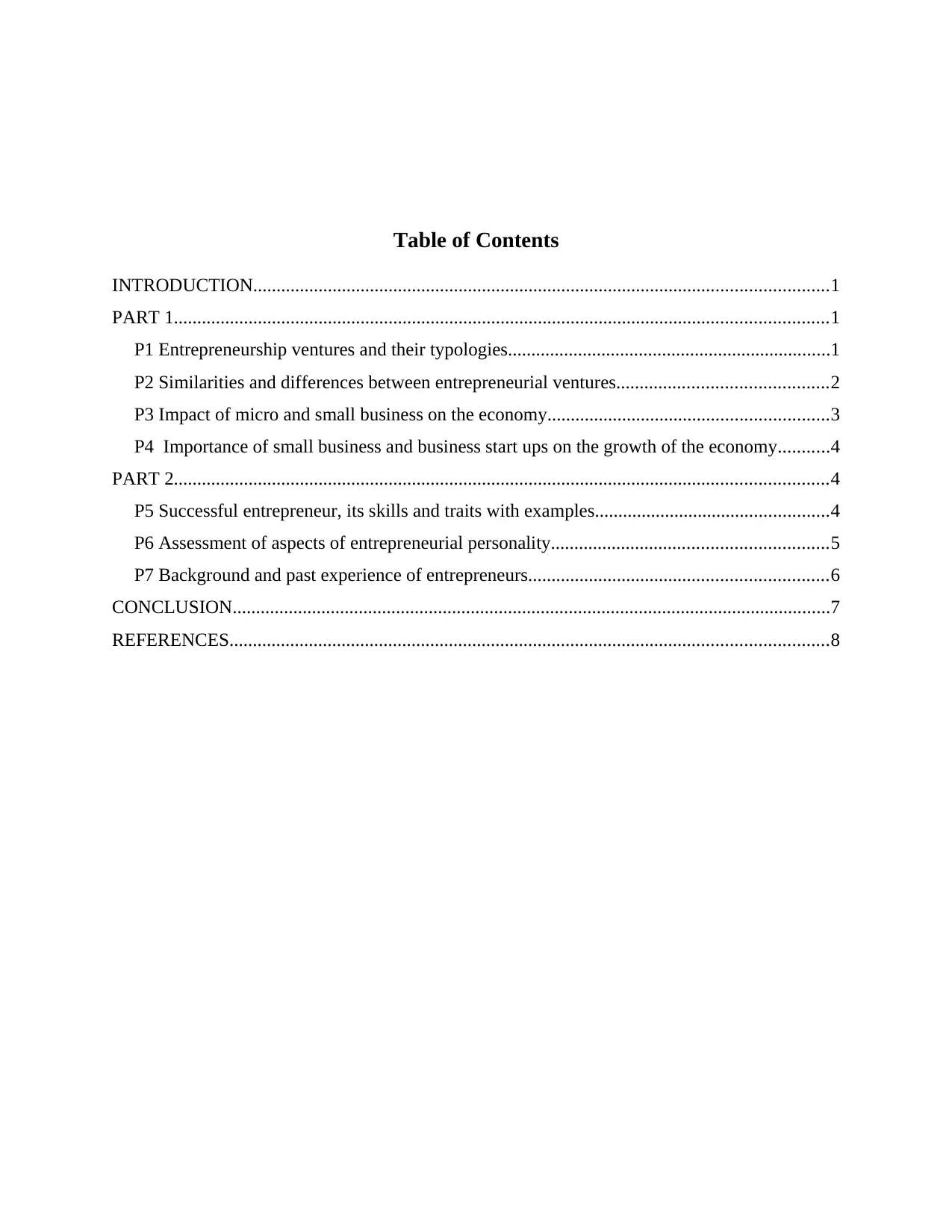
Table of Contents
INTRODUCTION...........................................................................................................................1
PART 1............................................................................................................................................1
P1 Entrepreneurship ventures and their typologies.....................................................................1
P2 Similarities and differences between entrepreneurial ventures.............................................2
P3 Impact of micro and small business on the economy............................................................3
P4 Importance of small business and business start ups on the growth of the economy...........4
PART 2............................................................................................................................................4
P5 Successful entrepreneur, its skills and traits with examples..................................................4
P6 Assessment of aspects of entrepreneurial personality...........................................................5
P7 Background and past experience of entrepreneurs................................................................6
CONCLUSION................................................................................................................................7
REFERENCES................................................................................................................................8
INTRODUCTION...........................................................................................................................1
PART 1............................................................................................................................................1
P1 Entrepreneurship ventures and their typologies.....................................................................1
P2 Similarities and differences between entrepreneurial ventures.............................................2
P3 Impact of micro and small business on the economy............................................................3
P4 Importance of small business and business start ups on the growth of the economy...........4
PART 2............................................................................................................................................4
P5 Successful entrepreneur, its skills and traits with examples..................................................4
P6 Assessment of aspects of entrepreneurial personality...........................................................5
P7 Background and past experience of entrepreneurs................................................................6
CONCLUSION................................................................................................................................7
REFERENCES................................................................................................................................8
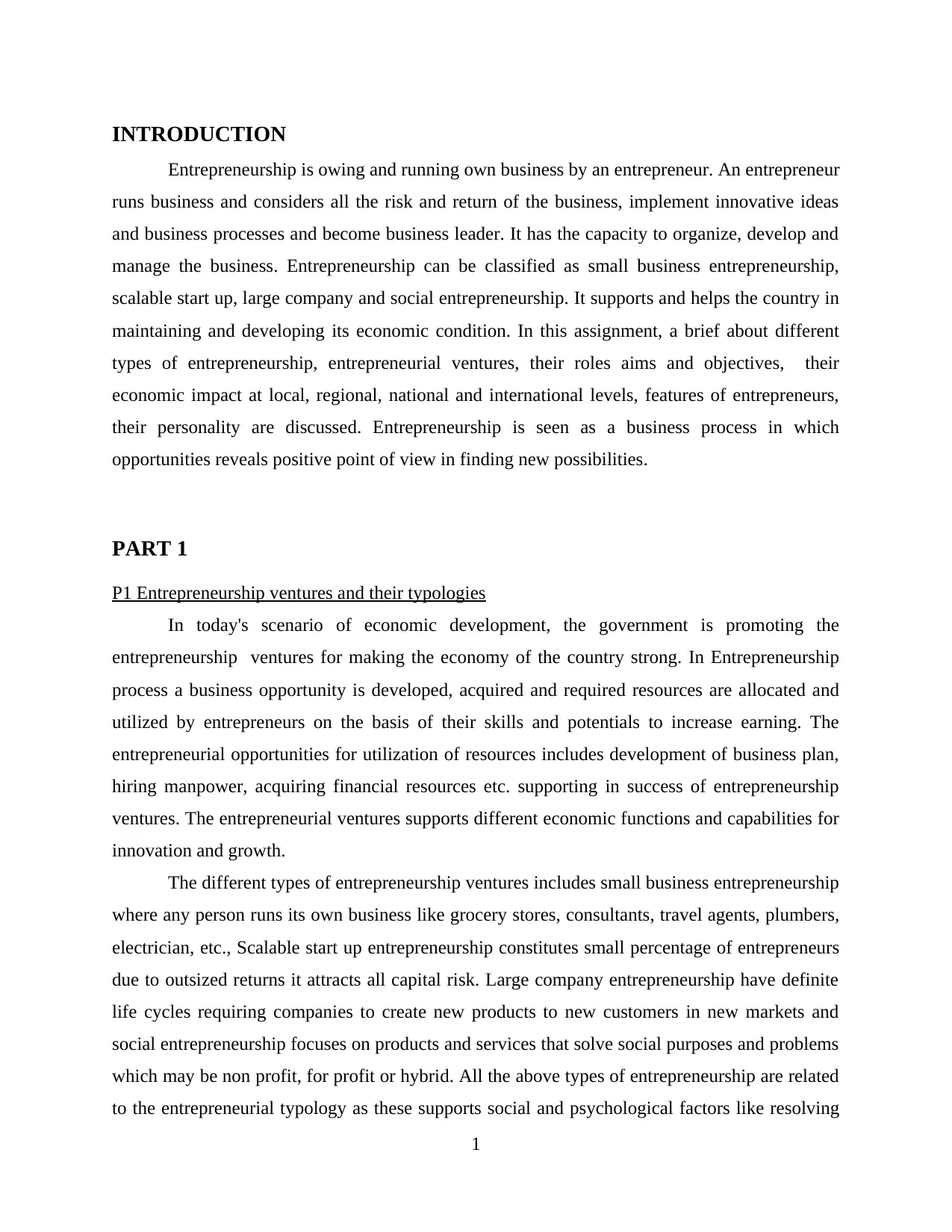
INTRODUCTION
Entrepreneurship is owing and running own business by an entrepreneur. An entrepreneur
runs business and considers all the risk and return of the business, implement innovative ideas
and business processes and become business leader. It has the capacity to organize, develop and
manage the business. Entrepreneurship can be classified as small business entrepreneurship,
scalable start up, large company and social entrepreneurship. It supports and helps the country in
maintaining and developing its economic condition. In this assignment, a brief about different
types of entrepreneurship, entrepreneurial ventures, their roles aims and objectives, their
economic impact at local, regional, national and international levels, features of entrepreneurs,
their personality are discussed. Entrepreneurship is seen as a business process in which
opportunities reveals positive point of view in finding new possibilities.
PART 1
P1 Entrepreneurship ventures and their typologies
In today's scenario of economic development, the government is promoting the
entrepreneurship ventures for making the economy of the country strong. In Entrepreneurship
process a business opportunity is developed, acquired and required resources are allocated and
utilized by entrepreneurs on the basis of their skills and potentials to increase earning. The
entrepreneurial opportunities for utilization of resources includes development of business plan,
hiring manpower, acquiring financial resources etc. supporting in success of entrepreneurship
ventures. The entrepreneurial ventures supports different economic functions and capabilities for
innovation and growth.
The different types of entrepreneurship ventures includes small business entrepreneurship
where any person runs its own business like grocery stores, consultants, travel agents, plumbers,
electrician, etc., Scalable start up entrepreneurship constitutes small percentage of entrepreneurs
due to outsized returns it attracts all capital risk. Large company entrepreneurship have definite
life cycles requiring companies to create new products to new customers in new markets and
social entrepreneurship focuses on products and services that solve social purposes and problems
which may be non profit, for profit or hybrid. All the above types of entrepreneurship are related
to the entrepreneurial typology as these supports social and psychological factors like resolving
1
Entrepreneurship is owing and running own business by an entrepreneur. An entrepreneur
runs business and considers all the risk and return of the business, implement innovative ideas
and business processes and become business leader. It has the capacity to organize, develop and
manage the business. Entrepreneurship can be classified as small business entrepreneurship,
scalable start up, large company and social entrepreneurship. It supports and helps the country in
maintaining and developing its economic condition. In this assignment, a brief about different
types of entrepreneurship, entrepreneurial ventures, their roles aims and objectives, their
economic impact at local, regional, national and international levels, features of entrepreneurs,
their personality are discussed. Entrepreneurship is seen as a business process in which
opportunities reveals positive point of view in finding new possibilities.
PART 1
P1 Entrepreneurship ventures and their typologies
In today's scenario of economic development, the government is promoting the
entrepreneurship ventures for making the economy of the country strong. In Entrepreneurship
process a business opportunity is developed, acquired and required resources are allocated and
utilized by entrepreneurs on the basis of their skills and potentials to increase earning. The
entrepreneurial opportunities for utilization of resources includes development of business plan,
hiring manpower, acquiring financial resources etc. supporting in success of entrepreneurship
ventures. The entrepreneurial ventures supports different economic functions and capabilities for
innovation and growth.
The different types of entrepreneurship ventures includes small business entrepreneurship
where any person runs its own business like grocery stores, consultants, travel agents, plumbers,
electrician, etc., Scalable start up entrepreneurship constitutes small percentage of entrepreneurs
due to outsized returns it attracts all capital risk. Large company entrepreneurship have definite
life cycles requiring companies to create new products to new customers in new markets and
social entrepreneurship focuses on products and services that solve social purposes and problems
which may be non profit, for profit or hybrid. All the above types of entrepreneurship are related
to the entrepreneurial typology as these supports social and psychological factors like resolving
1
⊘ This is a preview!⊘
Do you want full access?
Subscribe today to unlock all pages.

Trusted by 1+ million students worldwide
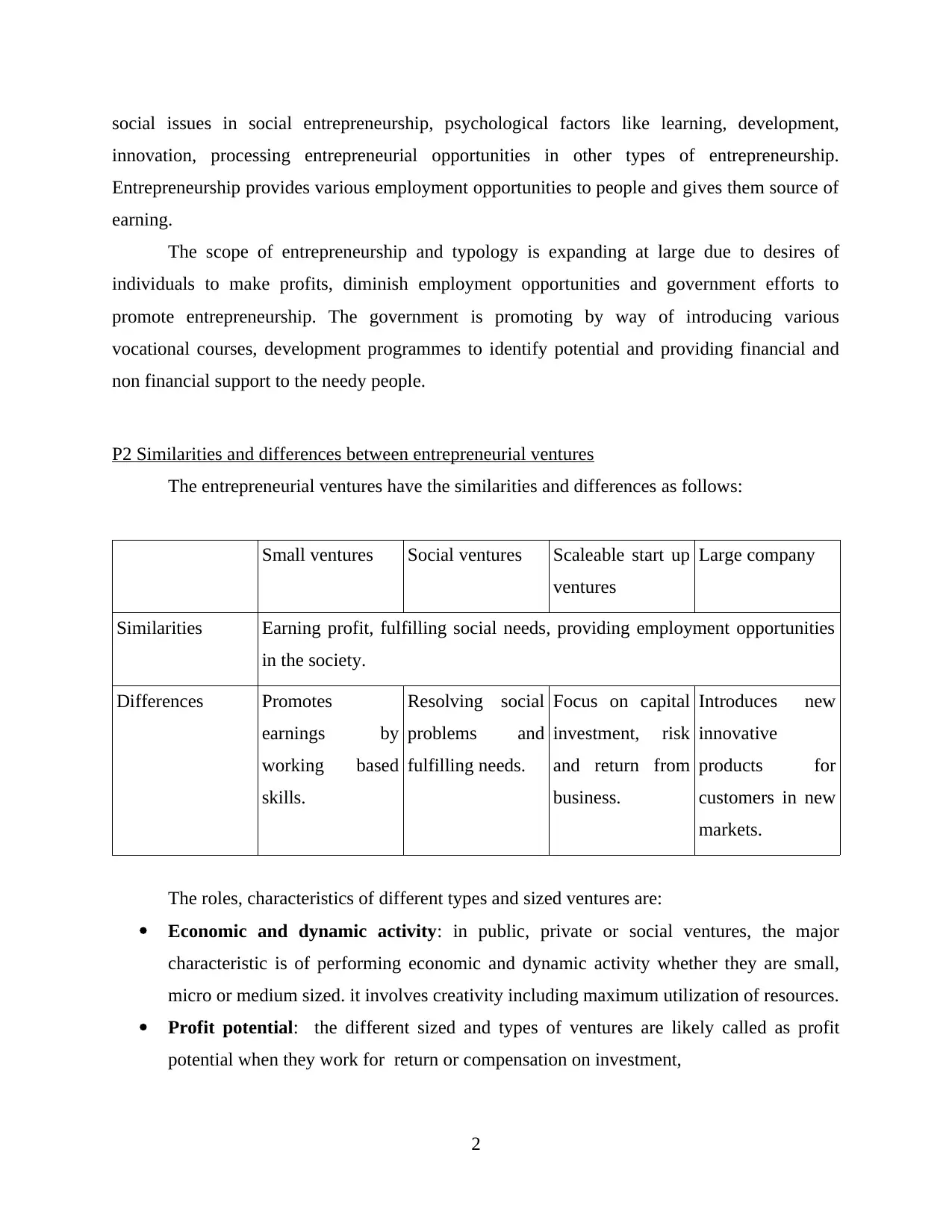
social issues in social entrepreneurship, psychological factors like learning, development,
innovation, processing entrepreneurial opportunities in other types of entrepreneurship.
Entrepreneurship provides various employment opportunities to people and gives them source of
earning.
The scope of entrepreneurship and typology is expanding at large due to desires of
individuals to make profits, diminish employment opportunities and government efforts to
promote entrepreneurship. The government is promoting by way of introducing various
vocational courses, development programmes to identify potential and providing financial and
non financial support to the needy people.
P2 Similarities and differences between entrepreneurial ventures
The entrepreneurial ventures have the similarities and differences as follows:
Small ventures Social ventures Scaleable start up
ventures
Large company
Similarities Earning profit, fulfilling social needs, providing employment opportunities
in the society.
Differences Promotes
earnings by
working based
skills.
Resolving social
problems and
fulfilling needs.
Focus on capital
investment, risk
and return from
business.
Introduces new
innovative
products for
customers in new
markets.
The roles, characteristics of different types and sized ventures are:
Economic and dynamic activity: in public, private or social ventures, the major
characteristic is of performing economic and dynamic activity whether they are small,
micro or medium sized. it involves creativity including maximum utilization of resources.
Profit potential: the different sized and types of ventures are likely called as profit
potential when they work for return or compensation on investment,
2
innovation, processing entrepreneurial opportunities in other types of entrepreneurship.
Entrepreneurship provides various employment opportunities to people and gives them source of
earning.
The scope of entrepreneurship and typology is expanding at large due to desires of
individuals to make profits, diminish employment opportunities and government efforts to
promote entrepreneurship. The government is promoting by way of introducing various
vocational courses, development programmes to identify potential and providing financial and
non financial support to the needy people.
P2 Similarities and differences between entrepreneurial ventures
The entrepreneurial ventures have the similarities and differences as follows:
Small ventures Social ventures Scaleable start up
ventures
Large company
Similarities Earning profit, fulfilling social needs, providing employment opportunities
in the society.
Differences Promotes
earnings by
working based
skills.
Resolving social
problems and
fulfilling needs.
Focus on capital
investment, risk
and return from
business.
Introduces new
innovative
products for
customers in new
markets.
The roles, characteristics of different types and sized ventures are:
Economic and dynamic activity: in public, private or social ventures, the major
characteristic is of performing economic and dynamic activity whether they are small,
micro or medium sized. it involves creativity including maximum utilization of resources.
Profit potential: the different sized and types of ventures are likely called as profit
potential when they work for return or compensation on investment,
2
Paraphrase This Document
Need a fresh take? Get an instant paraphrase of this document with our AI Paraphraser
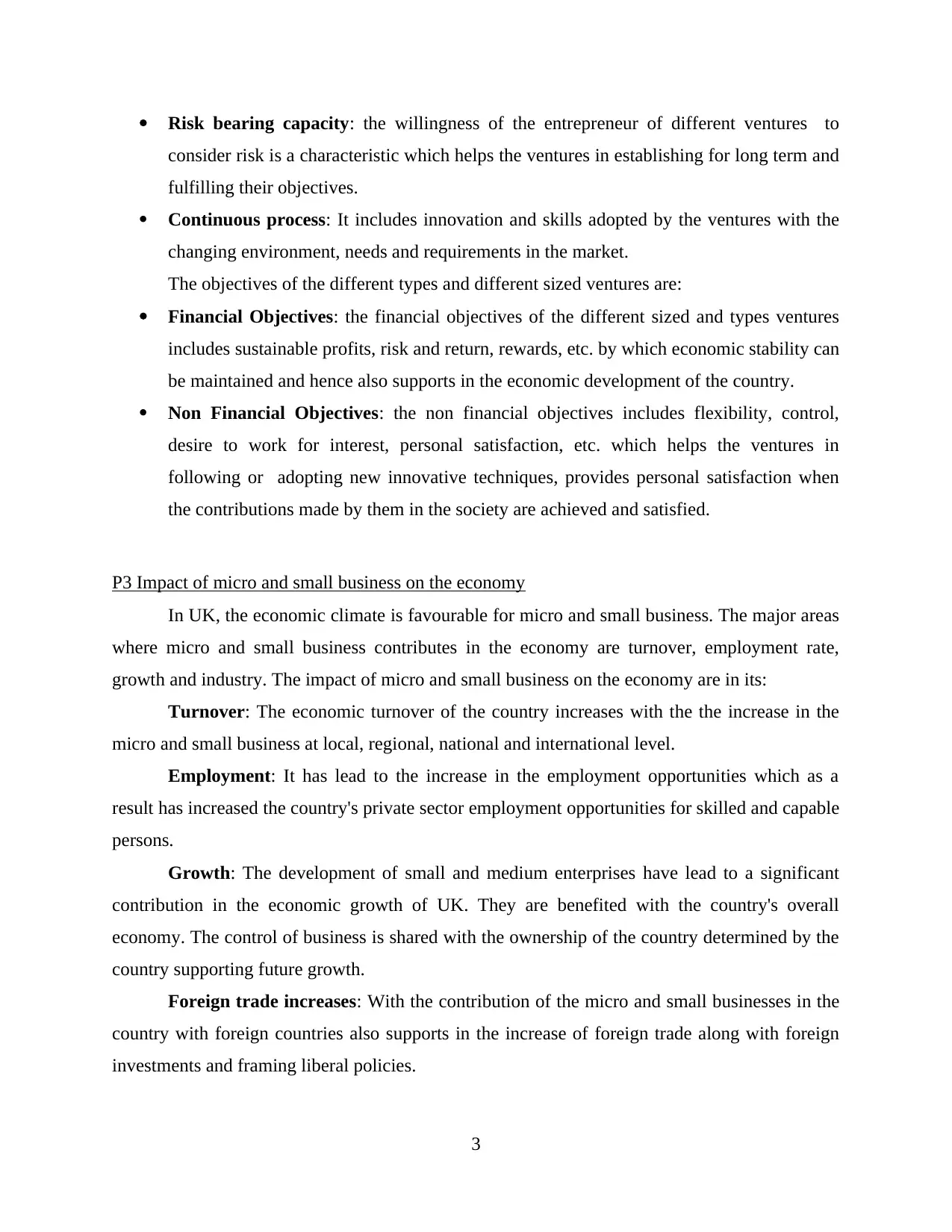
Risk bearing capacity: the willingness of the entrepreneur of different ventures to
consider risk is a characteristic which helps the ventures in establishing for long term and
fulfilling their objectives.
Continuous process: It includes innovation and skills adopted by the ventures with the
changing environment, needs and requirements in the market.
The objectives of the different types and different sized ventures are:
Financial Objectives: the financial objectives of the different sized and types ventures
includes sustainable profits, risk and return, rewards, etc. by which economic stability can
be maintained and hence also supports in the economic development of the country.
Non Financial Objectives: the non financial objectives includes flexibility, control,
desire to work for interest, personal satisfaction, etc. which helps the ventures in
following or adopting new innovative techniques, provides personal satisfaction when
the contributions made by them in the society are achieved and satisfied.
P3 Impact of micro and small business on the economy
In UK, the economic climate is favourable for micro and small business. The major areas
where micro and small business contributes in the economy are turnover, employment rate,
growth and industry. The impact of micro and small business on the economy are in its:
Turnover: The economic turnover of the country increases with the the increase in the
micro and small business at local, regional, national and international level.
Employment: It has lead to the increase in the employment opportunities which as a
result has increased the country's private sector employment opportunities for skilled and capable
persons.
Growth: The development of small and medium enterprises have lead to a significant
contribution in the economic growth of UK. They are benefited with the country's overall
economy. The control of business is shared with the ownership of the country determined by the
country supporting future growth.
Foreign trade increases: With the contribution of the micro and small businesses in the
country with foreign countries also supports in the increase of foreign trade along with foreign
investments and framing liberal policies.
3
consider risk is a characteristic which helps the ventures in establishing for long term and
fulfilling their objectives.
Continuous process: It includes innovation and skills adopted by the ventures with the
changing environment, needs and requirements in the market.
The objectives of the different types and different sized ventures are:
Financial Objectives: the financial objectives of the different sized and types ventures
includes sustainable profits, risk and return, rewards, etc. by which economic stability can
be maintained and hence also supports in the economic development of the country.
Non Financial Objectives: the non financial objectives includes flexibility, control,
desire to work for interest, personal satisfaction, etc. which helps the ventures in
following or adopting new innovative techniques, provides personal satisfaction when
the contributions made by them in the society are achieved and satisfied.
P3 Impact of micro and small business on the economy
In UK, the economic climate is favourable for micro and small business. The major areas
where micro and small business contributes in the economy are turnover, employment rate,
growth and industry. The impact of micro and small business on the economy are in its:
Turnover: The economic turnover of the country increases with the the increase in the
micro and small business at local, regional, national and international level.
Employment: It has lead to the increase in the employment opportunities which as a
result has increased the country's private sector employment opportunities for skilled and capable
persons.
Growth: The development of small and medium enterprises have lead to a significant
contribution in the economic growth of UK. They are benefited with the country's overall
economy. The control of business is shared with the ownership of the country determined by the
country supporting future growth.
Foreign trade increases: With the contribution of the micro and small businesses in the
country with foreign countries also supports in the increase of foreign trade along with foreign
investments and framing liberal policies.
3
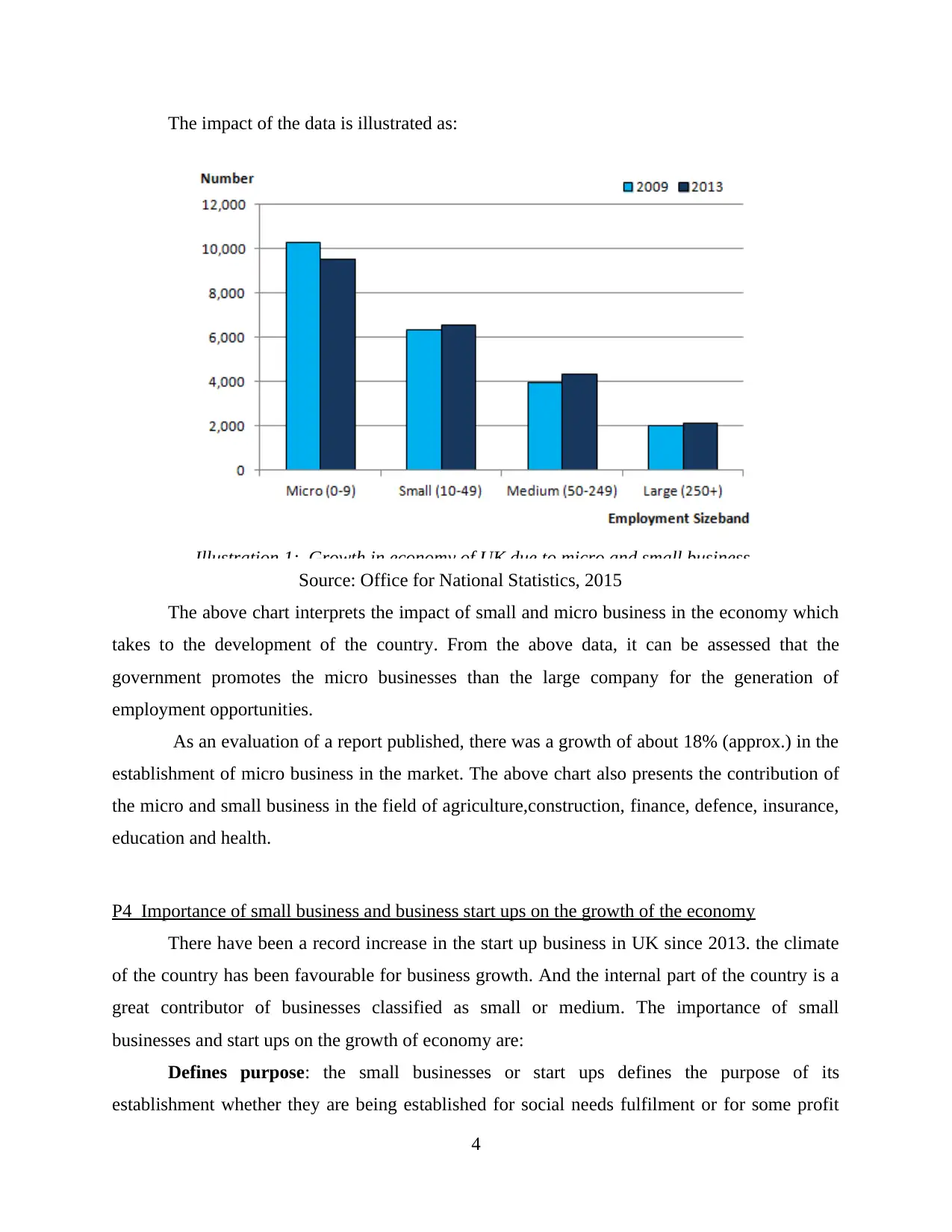
The impact of the data is illustrated as:
Source: Office for National Statistics, 2015
The above chart interprets the impact of small and micro business in the economy which
takes to the development of the country. From the above data, it can be assessed that the
government promotes the micro businesses than the large company for the generation of
employment opportunities.
As an evaluation of a report published, there was a growth of about 18% (approx.) in the
establishment of micro business in the market. The above chart also presents the contribution of
the micro and small business in the field of agriculture,construction, finance, defence, insurance,
education and health.
P4 Importance of small business and business start ups on the growth of the economy
There have been a record increase in the start up business in UK since 2013. the climate
of the country has been favourable for business growth. And the internal part of the country is a
great contributor of businesses classified as small or medium. The importance of small
businesses and start ups on the growth of economy are:
Defines purpose: the small businesses or start ups defines the purpose of its
establishment whether they are being established for social needs fulfilment or for some profit
4
Illustration 1: Growth in economy of UK due to micro and small business
Source: Office for National Statistics, 2015
The above chart interprets the impact of small and micro business in the economy which
takes to the development of the country. From the above data, it can be assessed that the
government promotes the micro businesses than the large company for the generation of
employment opportunities.
As an evaluation of a report published, there was a growth of about 18% (approx.) in the
establishment of micro business in the market. The above chart also presents the contribution of
the micro and small business in the field of agriculture,construction, finance, defence, insurance,
education and health.
P4 Importance of small business and business start ups on the growth of the economy
There have been a record increase in the start up business in UK since 2013. the climate
of the country has been favourable for business growth. And the internal part of the country is a
great contributor of businesses classified as small or medium. The importance of small
businesses and start ups on the growth of economy are:
Defines purpose: the small businesses or start ups defines the purpose of its
establishment whether they are being established for social needs fulfilment or for some profit
4
Illustration 1: Growth in economy of UK due to micro and small business
⊘ This is a preview!⊘
Do you want full access?
Subscribe today to unlock all pages.

Trusted by 1+ million students worldwide
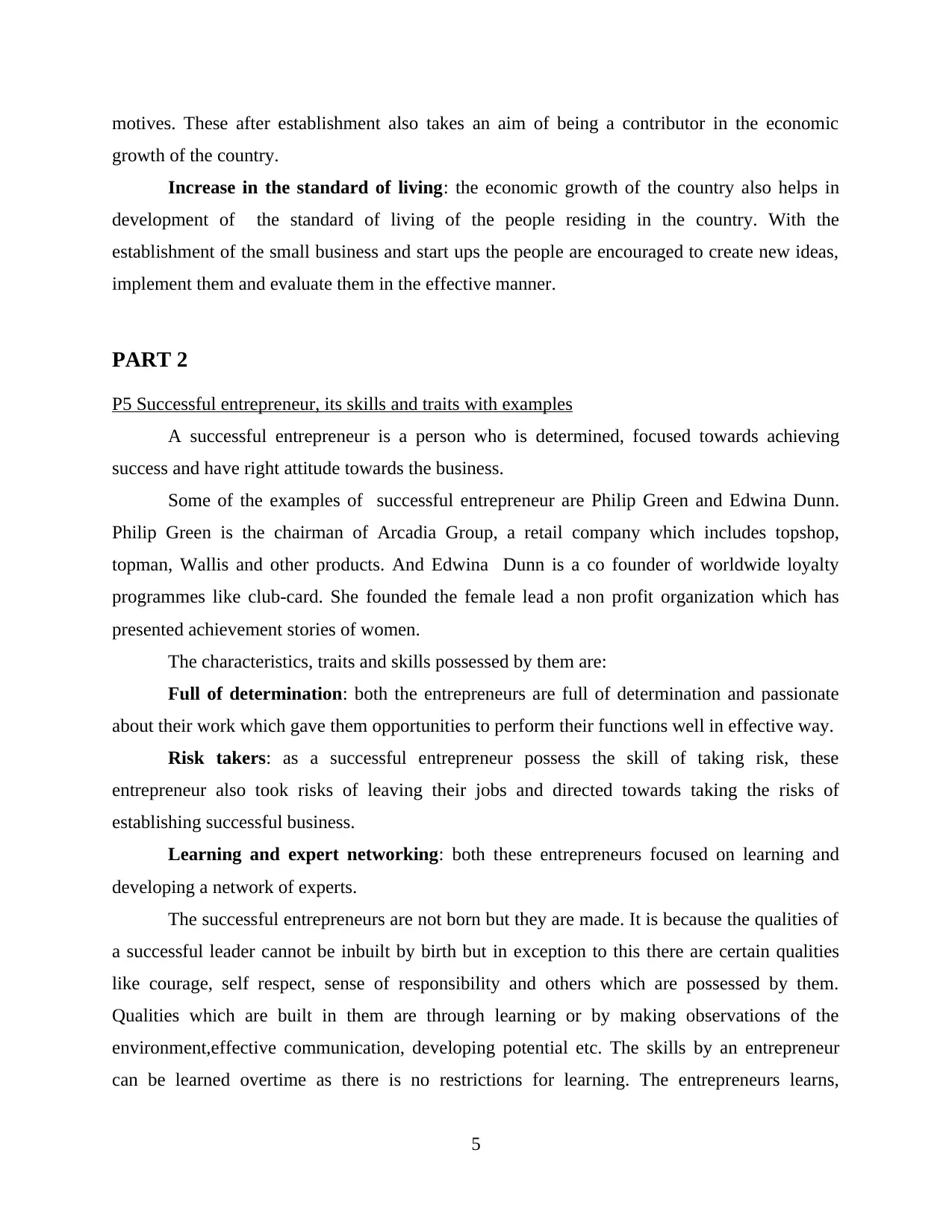
motives. These after establishment also takes an aim of being a contributor in the economic
growth of the country.
Increase in the standard of living: the economic growth of the country also helps in
development of the standard of living of the people residing in the country. With the
establishment of the small business and start ups the people are encouraged to create new ideas,
implement them and evaluate them in the effective manner.
PART 2
P5 Successful entrepreneur, its skills and traits with examples
A successful entrepreneur is a person who is determined, focused towards achieving
success and have right attitude towards the business.
Some of the examples of successful entrepreneur are Philip Green and Edwina Dunn.
Philip Green is the chairman of Arcadia Group, a retail company which includes topshop,
topman, Wallis and other products. And Edwina Dunn is a co founder of worldwide loyalty
programmes like club-card. She founded the female lead a non profit organization which has
presented achievement stories of women.
The characteristics, traits and skills possessed by them are:
Full of determination: both the entrepreneurs are full of determination and passionate
about their work which gave them opportunities to perform their functions well in effective way.
Risk takers: as a successful entrepreneur possess the skill of taking risk, these
entrepreneur also took risks of leaving their jobs and directed towards taking the risks of
establishing successful business.
Learning and expert networking: both these entrepreneurs focused on learning and
developing a network of experts.
The successful entrepreneurs are not born but they are made. It is because the qualities of
a successful leader cannot be inbuilt by birth but in exception to this there are certain qualities
like courage, self respect, sense of responsibility and others which are possessed by them.
Qualities which are built in them are through learning or by making observations of the
environment,effective communication, developing potential etc. The skills by an entrepreneur
can be learned overtime as there is no restrictions for learning. The entrepreneurs learns,
5
growth of the country.
Increase in the standard of living: the economic growth of the country also helps in
development of the standard of living of the people residing in the country. With the
establishment of the small business and start ups the people are encouraged to create new ideas,
implement them and evaluate them in the effective manner.
PART 2
P5 Successful entrepreneur, its skills and traits with examples
A successful entrepreneur is a person who is determined, focused towards achieving
success and have right attitude towards the business.
Some of the examples of successful entrepreneur are Philip Green and Edwina Dunn.
Philip Green is the chairman of Arcadia Group, a retail company which includes topshop,
topman, Wallis and other products. And Edwina Dunn is a co founder of worldwide loyalty
programmes like club-card. She founded the female lead a non profit organization which has
presented achievement stories of women.
The characteristics, traits and skills possessed by them are:
Full of determination: both the entrepreneurs are full of determination and passionate
about their work which gave them opportunities to perform their functions well in effective way.
Risk takers: as a successful entrepreneur possess the skill of taking risk, these
entrepreneur also took risks of leaving their jobs and directed towards taking the risks of
establishing successful business.
Learning and expert networking: both these entrepreneurs focused on learning and
developing a network of experts.
The successful entrepreneurs are not born but they are made. It is because the qualities of
a successful leader cannot be inbuilt by birth but in exception to this there are certain qualities
like courage, self respect, sense of responsibility and others which are possessed by them.
Qualities which are built in them are through learning or by making observations of the
environment,effective communication, developing potential etc. The skills by an entrepreneur
can be learned overtime as there is no restrictions for learning. The entrepreneurs learns,
5
Paraphrase This Document
Need a fresh take? Get an instant paraphrase of this document with our AI Paraphraser
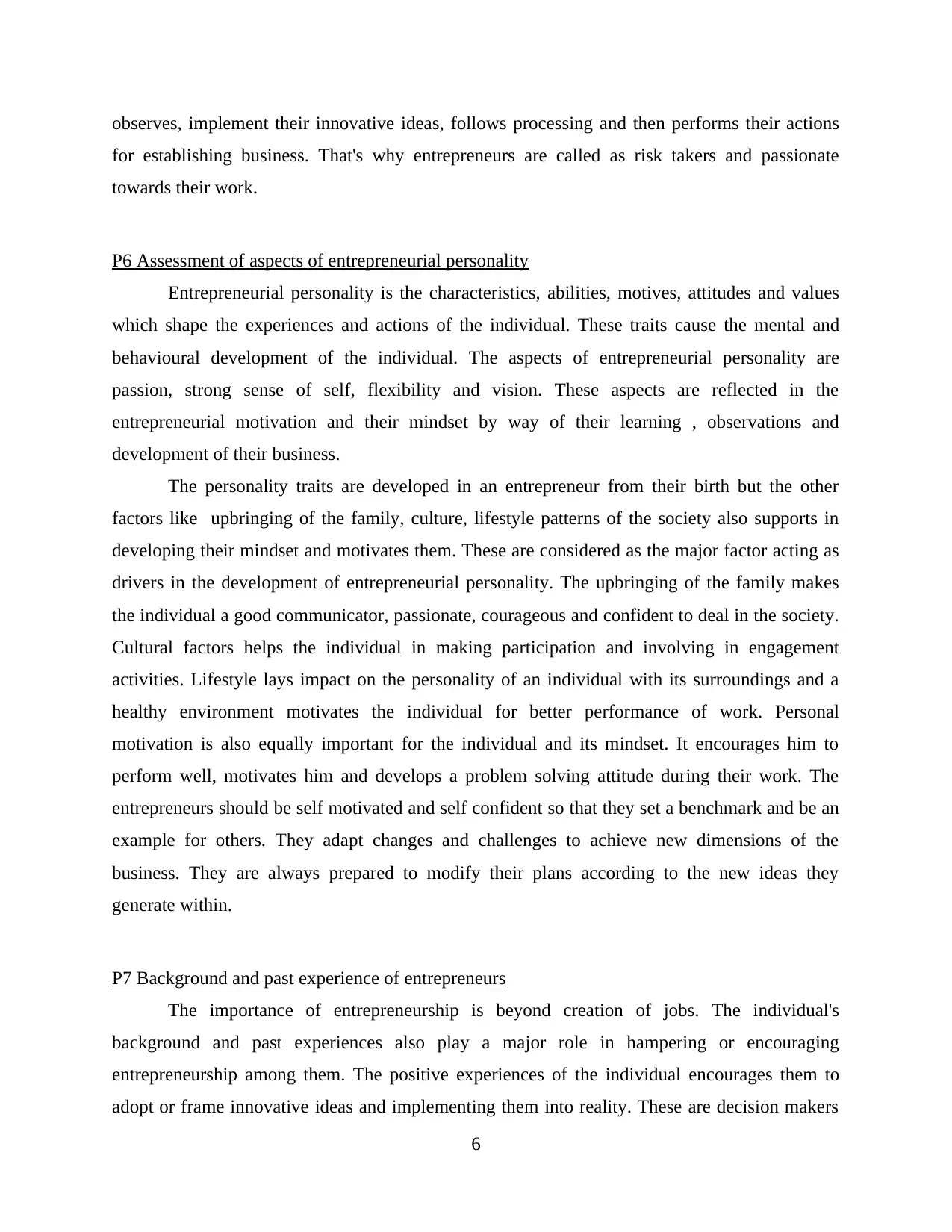
observes, implement their innovative ideas, follows processing and then performs their actions
for establishing business. That's why entrepreneurs are called as risk takers and passionate
towards their work.
P6 Assessment of aspects of entrepreneurial personality
Entrepreneurial personality is the characteristics, abilities, motives, attitudes and values
which shape the experiences and actions of the individual. These traits cause the mental and
behavioural development of the individual. The aspects of entrepreneurial personality are
passion, strong sense of self, flexibility and vision. These aspects are reflected in the
entrepreneurial motivation and their mindset by way of their learning , observations and
development of their business.
The personality traits are developed in an entrepreneur from their birth but the other
factors like upbringing of the family, culture, lifestyle patterns of the society also supports in
developing their mindset and motivates them. These are considered as the major factor acting as
drivers in the development of entrepreneurial personality. The upbringing of the family makes
the individual a good communicator, passionate, courageous and confident to deal in the society.
Cultural factors helps the individual in making participation and involving in engagement
activities. Lifestyle lays impact on the personality of an individual with its surroundings and a
healthy environment motivates the individual for better performance of work. Personal
motivation is also equally important for the individual and its mindset. It encourages him to
perform well, motivates him and develops a problem solving attitude during their work. The
entrepreneurs should be self motivated and self confident so that they set a benchmark and be an
example for others. They adapt changes and challenges to achieve new dimensions of the
business. They are always prepared to modify their plans according to the new ideas they
generate within.
P7 Background and past experience of entrepreneurs
The importance of entrepreneurship is beyond creation of jobs. The individual's
background and past experiences also play a major role in hampering or encouraging
entrepreneurship among them. The positive experiences of the individual encourages them to
adopt or frame innovative ideas and implementing them into reality. These are decision makers
6
for establishing business. That's why entrepreneurs are called as risk takers and passionate
towards their work.
P6 Assessment of aspects of entrepreneurial personality
Entrepreneurial personality is the characteristics, abilities, motives, attitudes and values
which shape the experiences and actions of the individual. These traits cause the mental and
behavioural development of the individual. The aspects of entrepreneurial personality are
passion, strong sense of self, flexibility and vision. These aspects are reflected in the
entrepreneurial motivation and their mindset by way of their learning , observations and
development of their business.
The personality traits are developed in an entrepreneur from their birth but the other
factors like upbringing of the family, culture, lifestyle patterns of the society also supports in
developing their mindset and motivates them. These are considered as the major factor acting as
drivers in the development of entrepreneurial personality. The upbringing of the family makes
the individual a good communicator, passionate, courageous and confident to deal in the society.
Cultural factors helps the individual in making participation and involving in engagement
activities. Lifestyle lays impact on the personality of an individual with its surroundings and a
healthy environment motivates the individual for better performance of work. Personal
motivation is also equally important for the individual and its mindset. It encourages him to
perform well, motivates him and develops a problem solving attitude during their work. The
entrepreneurs should be self motivated and self confident so that they set a benchmark and be an
example for others. They adapt changes and challenges to achieve new dimensions of the
business. They are always prepared to modify their plans according to the new ideas they
generate within.
P7 Background and past experience of entrepreneurs
The importance of entrepreneurship is beyond creation of jobs. The individual's
background and past experiences also play a major role in hampering or encouraging
entrepreneurship among them. The positive experiences of the individual encourages them to
adopt or frame innovative ideas and implementing them into reality. These are decision makers
6
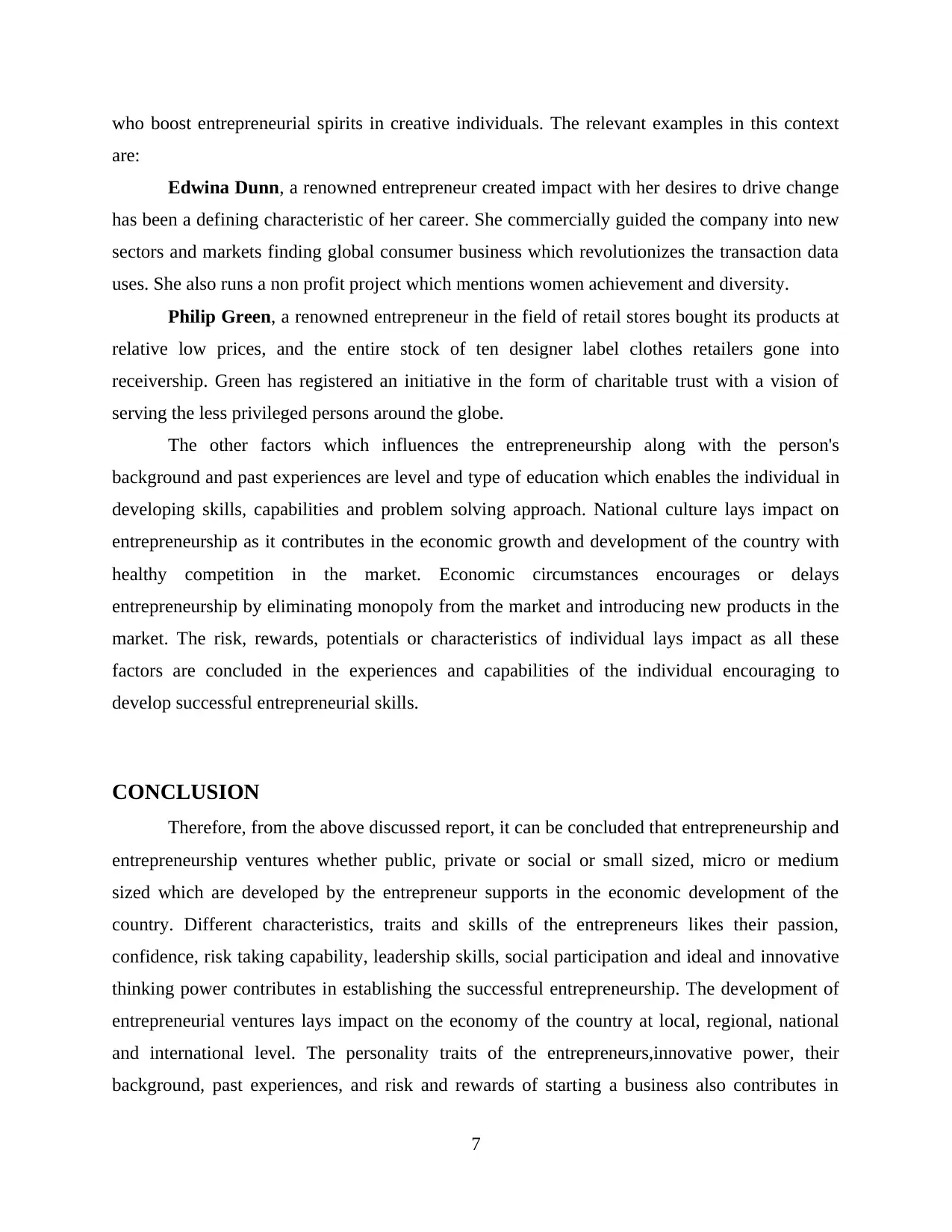
who boost entrepreneurial spirits in creative individuals. The relevant examples in this context
are:
Edwina Dunn, a renowned entrepreneur created impact with her desires to drive change
has been a defining characteristic of her career. She commercially guided the company into new
sectors and markets finding global consumer business which revolutionizes the transaction data
uses. She also runs a non profit project which mentions women achievement and diversity.
Philip Green, a renowned entrepreneur in the field of retail stores bought its products at
relative low prices, and the entire stock of ten designer label clothes retailers gone into
receivership. Green has registered an initiative in the form of charitable trust with a vision of
serving the less privileged persons around the globe.
The other factors which influences the entrepreneurship along with the person's
background and past experiences are level and type of education which enables the individual in
developing skills, capabilities and problem solving approach. National culture lays impact on
entrepreneurship as it contributes in the economic growth and development of the country with
healthy competition in the market. Economic circumstances encourages or delays
entrepreneurship by eliminating monopoly from the market and introducing new products in the
market. The risk, rewards, potentials or characteristics of individual lays impact as all these
factors are concluded in the experiences and capabilities of the individual encouraging to
develop successful entrepreneurial skills.
CONCLUSION
Therefore, from the above discussed report, it can be concluded that entrepreneurship and
entrepreneurship ventures whether public, private or social or small sized, micro or medium
sized which are developed by the entrepreneur supports in the economic development of the
country. Different characteristics, traits and skills of the entrepreneurs likes their passion,
confidence, risk taking capability, leadership skills, social participation and ideal and innovative
thinking power contributes in establishing the successful entrepreneurship. The development of
entrepreneurial ventures lays impact on the economy of the country at local, regional, national
and international level. The personality traits of the entrepreneurs,innovative power, their
background, past experiences, and risk and rewards of starting a business also contributes in
7
are:
Edwina Dunn, a renowned entrepreneur created impact with her desires to drive change
has been a defining characteristic of her career. She commercially guided the company into new
sectors and markets finding global consumer business which revolutionizes the transaction data
uses. She also runs a non profit project which mentions women achievement and diversity.
Philip Green, a renowned entrepreneur in the field of retail stores bought its products at
relative low prices, and the entire stock of ten designer label clothes retailers gone into
receivership. Green has registered an initiative in the form of charitable trust with a vision of
serving the less privileged persons around the globe.
The other factors which influences the entrepreneurship along with the person's
background and past experiences are level and type of education which enables the individual in
developing skills, capabilities and problem solving approach. National culture lays impact on
entrepreneurship as it contributes in the economic growth and development of the country with
healthy competition in the market. Economic circumstances encourages or delays
entrepreneurship by eliminating monopoly from the market and introducing new products in the
market. The risk, rewards, potentials or characteristics of individual lays impact as all these
factors are concluded in the experiences and capabilities of the individual encouraging to
develop successful entrepreneurial skills.
CONCLUSION
Therefore, from the above discussed report, it can be concluded that entrepreneurship and
entrepreneurship ventures whether public, private or social or small sized, micro or medium
sized which are developed by the entrepreneur supports in the economic development of the
country. Different characteristics, traits and skills of the entrepreneurs likes their passion,
confidence, risk taking capability, leadership skills, social participation and ideal and innovative
thinking power contributes in establishing the successful entrepreneurship. The development of
entrepreneurial ventures lays impact on the economy of the country at local, regional, national
and international level. The personality traits of the entrepreneurs,innovative power, their
background, past experiences, and risk and rewards of starting a business also contributes in
7
⊘ This is a preview!⊘
Do you want full access?
Subscribe today to unlock all pages.

Trusted by 1+ million students worldwide
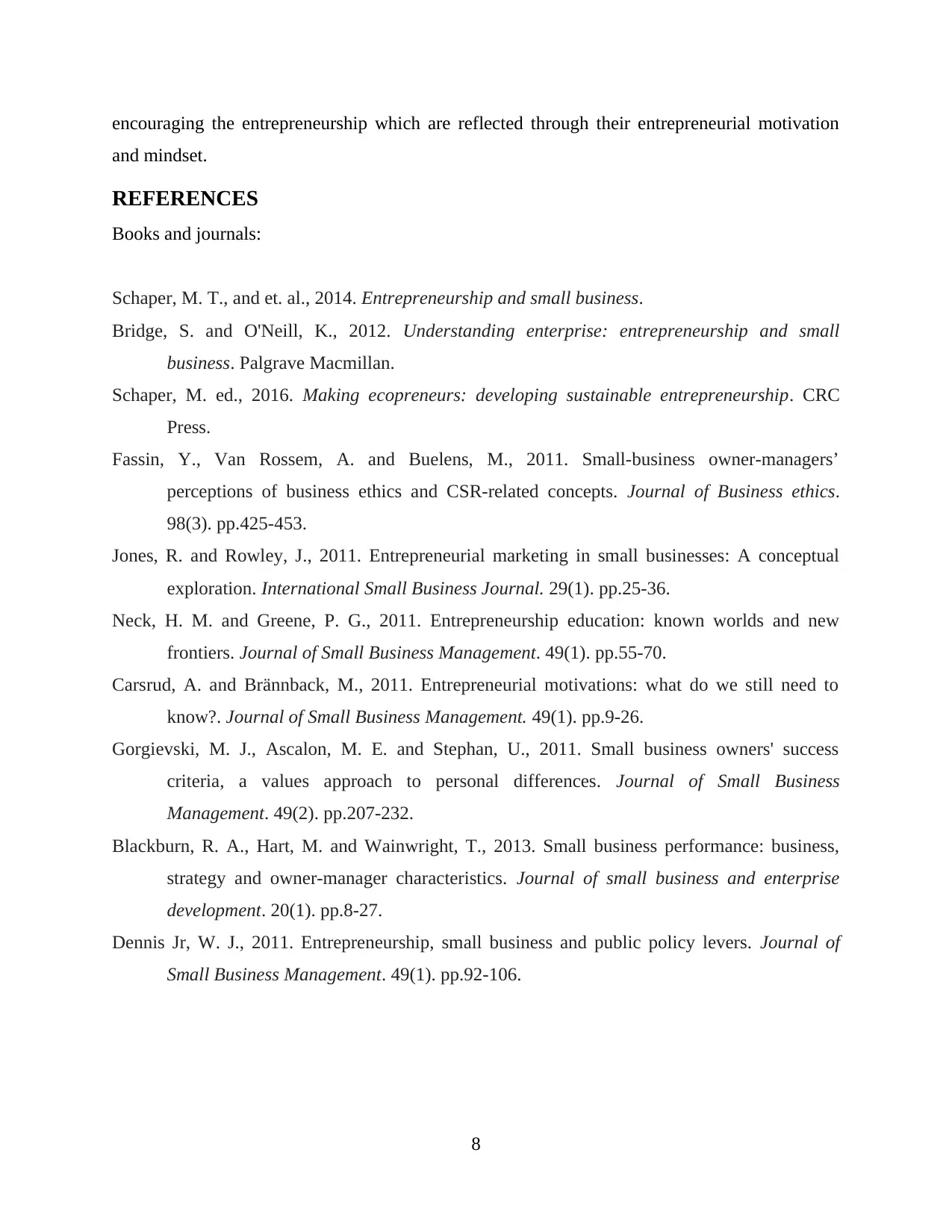
encouraging the entrepreneurship which are reflected through their entrepreneurial motivation
and mindset.
REFERENCES
Books and journals:
Schaper, M. T., and et. al., 2014. Entrepreneurship and small business.
Bridge, S. and O'Neill, K., 2012. Understanding enterprise: entrepreneurship and small
business. Palgrave Macmillan.
Schaper, M. ed., 2016. Making ecopreneurs: developing sustainable entrepreneurship. CRC
Press.
Fassin, Y., Van Rossem, A. and Buelens, M., 2011. Small-business owner-managers’
perceptions of business ethics and CSR-related concepts. Journal of Business ethics.
98(3). pp.425-453.
Jones, R. and Rowley, J., 2011. Entrepreneurial marketing in small businesses: A conceptual
exploration. International Small Business Journal. 29(1). pp.25-36.
Neck, H. M. and Greene, P. G., 2011. Entrepreneurship education: known worlds and new
frontiers. Journal of Small Business Management. 49(1). pp.55-70.
Carsrud, A. and Brännback, M., 2011. Entrepreneurial motivations: what do we still need to
know?. Journal of Small Business Management. 49(1). pp.9-26.
Gorgievski, M. J., Ascalon, M. E. and Stephan, U., 2011. Small business owners' success
criteria, a values approach to personal differences. Journal of Small Business
Management. 49(2). pp.207-232.
Blackburn, R. A., Hart, M. and Wainwright, T., 2013. Small business performance: business,
strategy and owner-manager characteristics. Journal of small business and enterprise
development. 20(1). pp.8-27.
Dennis Jr, W. J., 2011. Entrepreneurship, small business and public policy levers. Journal of
Small Business Management. 49(1). pp.92-106.
8
and mindset.
REFERENCES
Books and journals:
Schaper, M. T., and et. al., 2014. Entrepreneurship and small business.
Bridge, S. and O'Neill, K., 2012. Understanding enterprise: entrepreneurship and small
business. Palgrave Macmillan.
Schaper, M. ed., 2016. Making ecopreneurs: developing sustainable entrepreneurship. CRC
Press.
Fassin, Y., Van Rossem, A. and Buelens, M., 2011. Small-business owner-managers’
perceptions of business ethics and CSR-related concepts. Journal of Business ethics.
98(3). pp.425-453.
Jones, R. and Rowley, J., 2011. Entrepreneurial marketing in small businesses: A conceptual
exploration. International Small Business Journal. 29(1). pp.25-36.
Neck, H. M. and Greene, P. G., 2011. Entrepreneurship education: known worlds and new
frontiers. Journal of Small Business Management. 49(1). pp.55-70.
Carsrud, A. and Brännback, M., 2011. Entrepreneurial motivations: what do we still need to
know?. Journal of Small Business Management. 49(1). pp.9-26.
Gorgievski, M. J., Ascalon, M. E. and Stephan, U., 2011. Small business owners' success
criteria, a values approach to personal differences. Journal of Small Business
Management. 49(2). pp.207-232.
Blackburn, R. A., Hart, M. and Wainwright, T., 2013. Small business performance: business,
strategy and owner-manager characteristics. Journal of small business and enterprise
development. 20(1). pp.8-27.
Dennis Jr, W. J., 2011. Entrepreneurship, small business and public policy levers. Journal of
Small Business Management. 49(1). pp.92-106.
8
1 out of 10
Related Documents
Your All-in-One AI-Powered Toolkit for Academic Success.
+13062052269
info@desklib.com
Available 24*7 on WhatsApp / Email
![[object Object]](/_next/static/media/star-bottom.7253800d.svg)
Unlock your academic potential
Copyright © 2020–2025 A2Z Services. All Rights Reserved. Developed and managed by ZUCOL.





